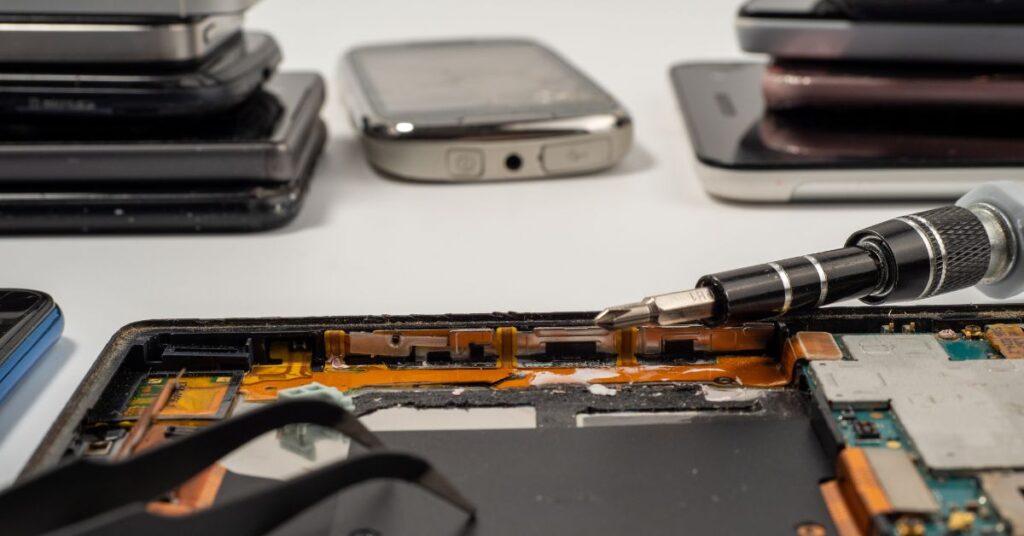The term “motherboard” may sound a little technical or abstract in the world of tech speak, but it refers to the central processing unit of your device. Consider it the central nervous system that regulates the operation of every other phone component. The motherboard is fundamentally the structure on which the rest of your phone is constructed. It is the main circuit board that houses and connects all the parts necessary for your device to function properly.
The motherboard is the underrated hero that keeps your smartphone operating at peak efficiency daily, handling everything from data processing to power management and communication. So, exactly Why is the motherboard important in a phone? Let’s learn the different aspects of this important part and see how it affects the way you use your smartphone.
Table of Contents
Components of a Smartphone Motherboard

Now that the importance of the motherboard has been built, let’s look at the different parts that include this important hardware assembly.
1. CPU (Central Processing Unit)
The CPU, often referred to as the brain of the device, handles all the processing tasks in your phone. It executes instructions, performs calculations, and manages the flow of data, essentially driving the operation of your smartphone.
2. RAM (Random Access Memory)
RAM serves as the short-term memory of your phone, allowing it to access and retrieve data quickly. It temporarily stores information that is actively being used by the CPU, enabling smooth multitasking and faster app performance.
3. GPU (Graphics Processing Unit)
The rendering of graphics and other visuals on your phone’s display is handled by the GPU. Whether you’re browsing the web, watching videos, or playing games, the GPU makes sure that the images and animations look clear, vibrant, and fluid.
4. Storage
Storage, including both internal memory and external storage options like SD cards, holds all your files, apps, photos, videos, and more. It provides a long-term repository for your data, allowing you to access and store information even when your device is powered off.
5. Connectivity Modules (Wi-Fi, Bluetooth, etc.)
Your phone can connect to wireless networks, other devices, and peripherals thanks to these modules. While Bluetooth enables wireless communication with headphones, speakers, smartwatches, and other devices, Wi-Fi enables high-speed internet access.
6. Power Management
Power management components regulate the flow of electricity within your phone, ensuring efficient energy usage and optimal battery life. They control charging processes, monitor power consumption, and implement power-saving features to prolong your device’s runtime.
Your smartphone’s performance and capabilities are shaped by each of these individual yet connected parts. When combined, they create a strong system that powers your device and gives it the ability to perform a variety of tasks quickly, effectively, and dependably.
Further Reading: Is it worth changing the phone motherboard
Role and Importance of the Motherboard

look into why the functioning of your smartphone depends so heavily on this central hub:
1. Integration of Components
The motherboard acts as the foundation for combining all of your phone’s necessary parts into a functional whole. It offers the physical links and channels necessary for seamless communication and operation between the CPU, RAM, GPU, storage, connectivity modules, and power management components.
2. Processing and Data Handling
As the conduit through which data flows, the motherboard plays a critical role in processing and handling information within your phone. It coordinates the execution of tasks by the CPU, manages data transfers between different components, and facilitates the storage and retrieval of data from memory.
3. Power Management and Efficiency
The motherboard is home to the power management components that control how electricity is used and distributed throughout your device. To increase overall efficiency and extend the life of your phone’s battery, it makes sure that energy is used efficiently, applies features that save power, and maximizes battery life.
4. Connectivity and Communication
Through its integrated connectivity modules, the motherboard enables your phone to connect to wireless networks, communicate with other devices, and transfer data seamlessly. Whether you’re browsing the internet, streaming media, or sharing files, the motherboard facilitates smooth and reliable connectivity.
5. Impact on Performance and User Experience
In the end, your smartphone’s performance and user experience are greatly influenced by the motherboard. How well your device works, how quickly it responds to commands, and how pleasurable it is to use are all directly influenced by its efficiency, processing power, connectivity, and overall integration.
Further Reading: How to recover data from a dead phone motherboard?
What happens without a motherboard in a phone?
Without a motherboard, a phone would essentially be a collection of separate components with no means of communication or coordination.

Here’s a breakdown of what would happen if a phone lacked a motherboard:
- Lack of Integration: The lack of a motherboard implies that the phone’s various components cannot be integrated using a single platform. Without a means of communication or cooperation, parts such as the CPU, RAM, GPU, storage, and connectivity modules would exist separately.
- No Processing or Data Handling: Since the CPU, RAM, and other processing components rely on the motherboard to function, there would be no processing or handling of data. The phone would be incapable of executing tasks, running apps, or storing/retrieving information from memory.
- Ineffective Power Management: The motherboard contains the power management components, which are responsible for controlling the distribution and consumption of electricity in the phone. This might result in excessive heating, wasteful energy use, and significantly shorter battery life.
- Limited Connectivity: The absence of integrated connectivity modules means the phone would be unable to connect to wireless networks or communicate with other devices. This would severely limit its functionality, rendering features like Wi-Fi, Bluetooth, and cellular connectivity non-existent.
- Complete Dysfunction: In the long term, the phone would be unusable without a motherboard acting as the focal point for all parts and operations. It would be little more than a collection of inert hardware parts since it wouldn’t have the basic infrastructure required for operation.
Phone doing any task without the motherboard
There is nothing a phone can do without its motherboard. The motherboard serves as the main hub that unifies and enables communication between all of the phone’s parts. The components wouldn’t be able to process data or cooperate without it. As a result, the phone would be reduced to a collection of disparate components that are unable to work together harmoniously.
do mobile phones come without a motherboard?
No, a motherboard is a standard component of mobile phones. Every mobile phone must have a motherboard, sometimes referred to as the mainboard or logic board. It functions as the main hub that unifies the CPU, RAM, GPU, storage, connectivity modules, and power management components of the phone. A mobile phone would not be able to function without its motherboard, which provides the infrastructure required for the device to function.
Why is the motherboard important in a phone? Final words
Because it acts as the main hub for integrating and coordinating all of the phone’s components, the motherboard is significant. It offers the physical connections and channels required for seamless communication and operation between parts such as the CPU, RAM, GPU, storage, connectivity modules, and power management components.
A phone cannot function without its motherboard, which provides the infrastructure needed for data processing, power management, connectivity, and overall performance and user experience. The motherboard, which enables a phone to function effectively and dependably, is essentially its spine.
FAQ
What is the motherboard in a phone?
The motherboard, also known as the mainboard or logic board, is the primary circuit board in a phone. It serves as the central hub that integrates and connects all of the device’s components.
How does the motherboard impact a phone’s performance?
The motherboard plays a significant role in shaping a phone’s performance by integrating components, processing data, managing power efficiently, facilitating connectivity, and ensuring the smooth operation of apps and features.
What happens if the motherboard of a phone is damaged?
Damage to the motherboard can cause various issues such as system crashes, performance degradation, connectivity problems, and complete device failure. Repairing or replacing the motherboard may be necessary to restore the phone’s functionality.
Can I upgrade the motherboard on my phone?
Generally, the motherboard in a phone cannot be upgraded independently, as it is tightly integrated with other components. Upgrading the motherboard would often require replacing the entire device.
